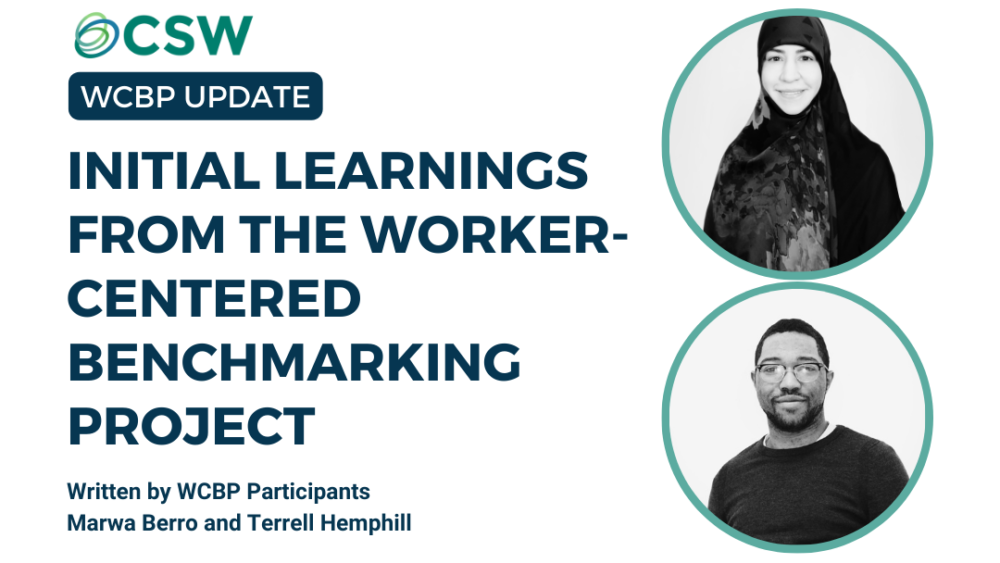Corporation for a Skilled Workforce (CSW) launched the Worker-Centered Benchmarking Project (WCBP) in February 2023. The project was designed to answer two questions: 1) How do we know if workforce programs are achieving their intended impact within the communities where they operate; 2) How do we know what communities want from workforce programs or even how success is defined? To answer these questions, CSW recruited six workforce development participants and alumni to form an advisory council and to serve as the project’s primary researchers.
Across ten hours in June, the advisory council gained a foundational understanding of workforce program evaluation, active listening, and effective questioning by interviewing practitioners, intermediaries, and funders about their impact assessment strategies. In July, the advisory council identified their preliminary research interests, developed interview and focus group protocols, and narrowed their list of interview questions from 58 to 10. In August, the advisory council held focus groups with 49 workforce development participants from across the country.
In September, advisory council members Marwa Berro and Terrell Hemphill presented their research to the 21 emerging leaders in the 2023 Southeast Michigan Workforce Leadership Academy, becoming the first active workforce development participants to feature as guest faculty in the Academy’s history. Below are highlights from that conversation.
Please introduce yourself and why you joined the advisory council:
Marwa Berro: I’m passionate about making a positive impact in my community and working towards its betterment, so joining the advisory council provided a personally enriching experience that offered an opportunity to learn from others and develop new transferable skills. I have a bachelor’s degree in public relations and advertising, and I was pursuing my master’s Thesis in corporate communication before I resided in Michigan two years ago. I have also undergone the Culinary Arts Training and Workforce program and earned related certificates at Zaman International.
Terrell Hemphill: I was invited to participate in the CSW advisory council after completing the IT Support program at Per Scholas Detroit. My goal when joining was to gain a deeper understanding of workforce programs across the country, share my overwhelmingly positive experience, and hopefully to get involved in the development and improvement of local workforce programs.
Can you tell us more about the focus groups conducted and the participants involved?
Berro: The focus group interviews were a crucial part of our efforts to gather qualitative insights from participants in the workforce program. We invited a diverse group of program participants, including alumni from different industries and backgrounds, different age groups, and different graduation years to ensure a comprehensive representation.
Hemphill: Many of our questions centered around the personal and emotional experience of the participants. We asked several questions regarding the types of support participants had access to and what resources they wish they had access to during or after the program. We asked about their definitions of success within and outside the programs and compared those to the program’s definition of success.
What questions did you ask and how did you develop those questions?
Berro: The advisory council members had meetings with several experts and professionals to gain knowledge on how success is measured from the workforce perspective. After the general overview, we did our readings on how to conduct qualitative research, agreed on leading focus group interviews, and started working on the questions, interview, and focus group protocols. We brainstormed about 58 questions. The questions that we asked were based on the participants’ reasons for why they joined the workforce program and what they were looking for in the program. We also asked about their experience (thoughts and feelings), and if they enjoyed it or not. How were they supported or motivated emotionally? By whom or how? What barriers or obstacles did they face? And what does a successful completion of a workforce program look like for them?
Based on the responses you heard, were there any common suggestions for how to measure success?
Berro: The focus group participants highlighted the importance of taking into consideration not only the traditional employment outcomes, such as wage increase and job placement, but also broader indicators including skills gained, confidence levels, and personal growth. The most significant insight was to measure the shift in the participants’ mindset from a fixed mindset to a growth mindset and how they started to see things from new perspectives. This shift in mindset combined with the boost of self-confidence makes magic. The participants started to seek higher education levels which helped them to gain more knowledge and new skills to find better jobs and develop a better life.
Hemphill: The discussions about definitions of success were interesting because we were able to see different priorities at play when moving from the program to the participant. Program success was more based on hard data (graduation percentages, average salary after the program, etc.), while participant definitions were centered around personal satisfaction, self-esteem, and respect in the workplace. We also saw how a difference in program structure can impact how success is defined. Participants from a “bootcamp” style program tended to be focused on monetary and career development rather than personal satisfaction. Those from more community-based organizations were more aligned to the goals of self-esteem and building community.
Did you observe any advantages to enlisting program alumni as focus group facilitators?
Berro: Being a workforce program alumni played an important role in helping the focus group participants to feel comfortable with opening up and giving honest answers to interview questions. The interviews were basically informal, and all the participants felt safe sharing their experiences. There was a friendly competitive atmosphere to see who would give the best answers. In addition, being a program alumnus helped me understand the workforce program they went through, so I didn’t have to waste time understanding what the program was about and what they learned from it.
Hemphill: We found that having program alumni facilitate these groups helps create a safe environment for candid sharing. It becomes easier for the participants to see the facilitators as peers rather than outside agents. When talking about negative experiences, knowing that the facilitator is a product of these types of programs as well encourages people to share things they normally wouldn’t. Having program graduates participate on the advisory council also allowed for a more reflective experience and perspective shift for the facilitators themselves.
What areas of success and specific metrics are you most interested in investigating next?
Berro: There are several areas I’m interested in investigating. One of them is the emotional intelligence of the instructors and mentors, as well as anyone who comes into daily contact with the participants. It is a success to have emotionally intelligent people who are a safe place for participants to divulge, and they are better able to recognize the signs and symptoms of mental challenges or mental disorders to provide additional support. Also, the participants’ can-do attitudes, which motivate them to volunteer and give back to the organization that supported them, are invaluable.
Hemphill: The topic I’m most interested in for future work is gaining understanding of how to get programs to value the aspects of self-esteem, personal development, etc. that the community-based participants touched on. I want to better understand how resources are allocated to these programs and how we can adjust priorities and resource allocation to create a better experience for everyone involved.
How might the workforce leaders in the room put your learnings into practice?
Berro: Workforce leaders can implement these insights in program improvements, by:
- customizing training modules that not only teach technical skills but also prioritize personal development and mindset transformation. These modules should be flexible and adaptable to meet the requirements and aspirations of the participants.
- Implementing mentorship and coaching programs within the workforce training initiatives. Pairing participants with experienced mentors who can help them develop confidence, soft skills, and a growth mindset can be highly effective in promoting overall success.
- Encouraging regular self-evaluation and feedback loops for program participants. This will help them track their progress in terms of confidence, skill development, and mindset shift. It also provides an opportunity for program adjustments based on participant feedback.
- Continuously measure and evaluate the impact of the training programs on participants at various stages of the program to assess its effectiveness.
- Regularly review and adapt program content and methodologies based on the insights and feedback gathered from participants.
- Facilitating the creation of peer learning and support networks among program participants.
- Sharing success stories with other workforce development organizations and leaders on the impact of the workforce program on participants.
Hemphill: Workforce leaders can do so much by just asking questions. Create a space where participant feedback is as unbiased as possible, collect and share that feedback with the leadership team and participants, and finally enlist participants to help develop and deploy the solutions you all come up with. This work must be collaborative if we want the outcome to be mutually beneficial.
The WCBP final report will be released in January, 2023 including all data and recommendations. You can see Marwa and Terrell along with the rest of the advisory council present early findings from their work at the CAEL Conference on November 9th.



Comments are closed.